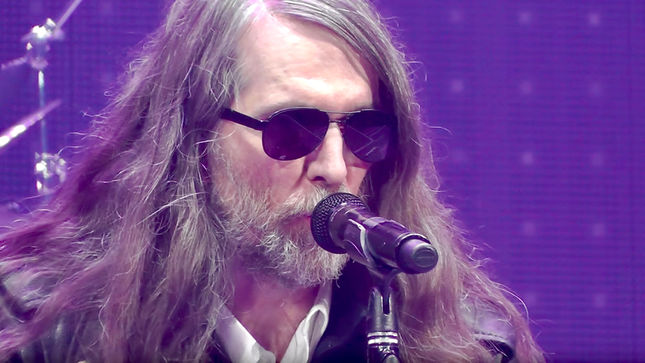TRANS-SIBERIAN ORCHESTRA Mastermind PAUL O'NEILL Reportedly Died Of Accidental Prescription Drug Overdose
May 30, 2017, 7 years ago

Trans-Siberian Orchestra co-founder and creative force, Paul O’Neill, passed away on April 5th at age 61. A report from TMZ, reveals that Paul died from a combination of prescription drugs.
“TMZ obtained a copy of O'Neill's autopsy report, and it says he died of intoxication from a mix of methadone, codeine, diazepam (generic Valium) and doxylamine (an antihistamine). According to the doc, the cause of death is intoxication... but it also mentions other ailments O'Neill was battling… such as mild heart disease, hypertension and moderate hardening of the arteries. The medical examiner determined the death to be accidental.”
O'Neill broke into the scene in the ‘80s when he was hired at Leber-Krebs Inc., the management company that launched the careers of Aerosmith, AC/DC, Def Leppard, Scorpions and Ted Nugent among many others. But it was his collaboration with Floridian metallers Savatage that would set him up for for greatness, particularly albums like Hall Of The Mountain King, Gutter Ballet, Streets: A Rock Opera and Dead Winter Dead.
O'Neill had grandiose visions of a bigger rock opera in line with Pink Floyd, Queen and Emerson, Lake & Palmer, but with a Christmas slant!
The oddly-named Trans-Siberian Orchestra launched their Christmas trilogy in 1996 with Christmas Eve and Other Stories, a daring vision led by the single ”Christmas Eve/Sarajevo 12/24”. 1998’s The Christmas Attic and The Lost Christmas Eve in 2004 followed. TSO released three non-holiday rock operas called Beethoven's Last Night (2000), Night Castle (2009) and 2015’s Letters From The Labyrinth.
And its become a massive success, as 2016 was another record-breaking year for the entity. TSO’s Winter Tour 2016 sold the most tickets per show in the group’s history, with a total in excess of million one million! The tour also set a record gross for TSO with a total of more than $56.9 million.
20 years since the band’s first album, and since its historic touring debut, TSO has played in excess of 1,800 shows for more than 14 million fans, with tour grosses of over $625 million, and sold in excess of 12 million albums and DVDs. In 2009, Billboard magazine placed TSO at #25 on its Top Touring Artists Of The Decade.
BraveWords scribe Martin Popoff spoke to O'Neill in late 2015 when the last TSO album (Letters From The Labyrinth) was launched.
“Getting the band to this point was hard,” reflects Paul, asked about how the team could possibly top the TSO of 2014, who pretty much executed the most extravagant rock concert this writer has ever seen. “Keeping it here and not letting down expectations is harder. We’re lucky because technology keeps advancing. We want to give people the comfort of what they expect, but something new to make it exciting. That’s getting harder and harder every year, as this thing gets larger and larger.”
“The other thing that has actually really come into its own, especially recently, is the fact that we’re seeing so many people in their young 30s, who first saw the band when they were teenagers and they’re now coming back bringing their own kids. The band has survived the two decade mark and kept its original fan base—much to our happy surprise—and has brought in the next generation. People who had originally seen us as teenagers are returning and bringing their own kids with them. Hopefully, those kids will return and bring their kids with them.”
“We always say that music has got the ability to jump a lot of silly walls people put between people, whether it’s nationality or economic class or religion or whatever. When you jump the generational wall, that’s the biggest jump of all. To a certain degree, TSO had an unbelievably lucky break because when we started to tour. It was 1999. In 1949, there was a great schism in music when Les Paul, and Leo Fender, invented the electric guitar. You either grew up pre-electric guitar—with the Dorsey Brothers and Perry Como—or, post-electric guitar: Elvis Presley, Chuck Berry. When we started to tour, it had been half a century, and now it’s been well over 60 years. So even grandma and grandpa—that’s the Woodstock generation. Unless you’re in your late 90s, for the first time, every generation has rock in common. Which makes it a lot easier for us to jump the generational walls than bands that came before us. We’re very aware that we have a very wide audience, and you have to be very careful that there’s something there for everybody, so everybody keeps coming back every year, whether it’s summer or the winter. It can continue to be at least a partial part of the soundtrack of people’s lives.”
As for the future, the band will continue to provoke minds with their non-seasonal existence, but there’s also the call of... Broadway, live theatre.
“Yes, basically these days, our next step is to head towards Broadway, just because I love the coherent story telling of Broadway. I’ve known a lot of bands that have done rock operas that even after they explain it to me, I’m like, huh? I just don’t get it. Broadway never really got the true edge of rock, and whether it’s from a production point-of-view or it’s just rock credibility, they just simply don’t understand it. For me, it’s just a natural marriage. It’s time for rock to enter Broadway. Not that there’s anything wrong with old fashioned Broadway, but how many times can you re-open Oklahoma!? It’s a great musical, but it’s more suitable for the ‘40s than it is for the new millennium.”
Read more at BraveWords.











